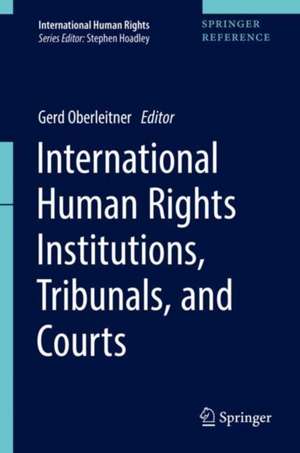International Human Rights Institutions, Tribunals, and Courts: International Human Rights
Editat de Gerd Oberleitneren Limba Engleză Hardback – 8 oct 2018
This book introduces readers to the major human rights institutions, courts, and tribunals and critically assesses their legacy as well as the promise they hold for realizing human rights globally, and the challenges they face in doing so. It traces the rationale of setting up international institutions, courts, and tribunals with the aim of ensuring respect for international human rights law and presents their historic development, and critically analyzes their contribution to the promotion and protection of human rights. At the same time, it asks which promises old and new (and envisaged) human rights institutions hold for safeguarding human rights in light of continuing violations and recent global trends in human rights and politics.
The first section presents institutions created within the framework of the United Nations. The second part of the volume assesses how international criminal tribunals have reframed human rights violations as individual criminal acts. The third part of the volume is devoted to established and emerging regional human rights bodies and courts around the world.
Preț: 2822.16 lei
Preț vechi: 3713.37 lei
-24% Nou
Puncte Express: 4233
Preț estimativ în valută:
540.01€ • 565.33$ • 446.83£
540.01€ • 565.33$ • 446.83£
Carte tipărită la comandă
Livrare economică 01-07 aprilie
Preluare comenzi: 021 569.72.76
Specificații
ISBN-13: 9789811052057
ISBN-10: 9811052050
Pagini: 390
Ilustrații: XVIII, 623 p. 3 illus. in color.
Dimensiuni: 155 x 235 x 36 mm
Ediția:1st ed. 2018
Editura: Springer Nature Singapore
Colecția Springer
Seria International Human Rights
Locul publicării:Singapore, Singapore
ISBN-10: 9811052050
Pagini: 390
Ilustrații: XVIII, 623 p. 3 illus. in color.
Dimensiuni: 155 x 235 x 36 mm
Ediția:1st ed. 2018
Editura: Springer Nature Singapore
Colecția Springer
Seria International Human Rights
Locul publicării:Singapore, Singapore
Cuprins
Chapter 1: Human rights institutions: what legitimacy? what authority?.- Part 1: United Nations human rights institutions.- Chapter 3: The UN Human Rights Council: achievements 2006-2016 and challenges ahead.- Chapter 4: The UN High Commissioner for Human Rights and field operations.- Chapter 5: UN Human Rights Treaty Bodies: impact and future.- Chapter 6: The UN Human Rights Committee.- Chapter 7: The UN Committee of Economic, Social and Cultural Rights.- Chapter 8: Gender in the UN: CEDAW and the Commission on the Status of Women.- Chapter 9: The UN Security Council and human rights.- Chapter 10: Why a World Court of Human Rights?.- Part 2: Human rights violations as crimes - international courts and tribunals.- Chapter 11: The Legacy of Nuremberg and Tokyo.- Chapter 12: Prosecuting human rights violations: what legacy of the ad hoc criminal tribunals for the former Yugoslavia and Rwanda? .- Chapter 13: What future for ad hoc tribunals?.- Chapter 14: The International Criminal Courtbetween human Rights and realpolitik.- Chapter 15: Towards effective enforcement of international humanitarian law.- Chapter 16: Transitional Justice: the legacy and future of Truth and Reconciliation Commissions.- Part 3: Regional human rights systems.- Chapter 17: The European Court of Human Rights: achievements and prospects.- Chapter 18: The Inter-American Commission and Court of Human Rights.- Chapter 19: The African Commission on Human and Peoples’ Rights and the African Court of Justice and Human and Peoples' Rights.- Chapter 20: The Arab Human Rights Commission.- Chapter 21: The ASEAN Human Rights Commission.- Chapter 22 : An Agenda for Strengthening Human Rights Institutions.
Notă biografică
Gerd Oberleitner is UNESCO Chair in Human Rights and Human Security and Director of the European Training and Research Centre for Human Rights and Democracy at the University of Graz and Associate Professor of International Law at the Institute of International Law and International Relations, also at the University of Graz. He has served as Legal Adviser in the Human Rights Department of the Austrian Foreign Ministry, was Lecturer in Human Rights at the London School of Economics and Political Science and Visiting Fellow at the LSE’s Centre for the Study of Human Rights, and has taught and researched at the European Inter-University Centre in Venice, the Université du Quebéc à Montréal, the University of Ljubljana, Prishtina, and Rutgers University. He teaches in the Global Campus of Regional Human Rights Master Programmes.
Caracteristici
A critical introduction to the past, present, and future of human rights institutions Multi-disciplinary approach to the legal and political aspects of human rights institutions, courts, and tribunals Examines a wide range of human rights institutions from all over the globe Includes supplementary material: sn.pub/extras




